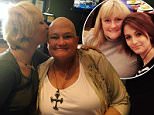I'm the Duke of Windsor's secret grandson: That's the sensational claim of a French hotelier. Deluded? Read his evidence and decide, writes RICHARD KAY
- Francois Graftieaux has published memoir The Man Who Should Have Been King
- Claims his father was result of affair between future King Edward VIII and his grandmother Marie-Leonie Graftieaux, a Parisian seamstress
- Francois has even offered to submit to a DNA test to prove his claims
After a lifetime in the hotel and hospitality business, Francois Graftieaux was used to dealing in secrets. 'Privacy, being discreet and keeping a confidence — they are the currency of my industry,' he says.
But for the past decade, his discretion has been tested as never before. For a secret he believes he has stumbled across concerns not some guest at one of the many five-star establishments he has managed all over the world, but comes from his own family background.
French-born Graftieaux, who has never married and lives quietly on the Algarve, is convinced he is the Duke of Windsor's secret grandson.
This is such a bold assertion that if true — and were legitimacy not a factor — it might mean he would have a claim on the throne itself. And understandably it has given rise to deep indignation among Buckingham Palace courtiers.


French-born Francois Graftieaux (right), who has never married and lives quietly on the Algarve, is convinced he is the Duke of Windsor's (left) secret grandson
This week, Graftieaux laid out his years of research, together with some fanciful speculation, in a memoir published in France under the mischievous title The Man Who Should Have Been King.
Ostensibly, it is a title which refers to Edward VIII, who of course chose abdication over the crown. But it also suggests that Francois's father could have had a claim to be king.
Significantly, in abdicating Edward renounced the throne both for himself and 'for my descendants', which effectively cancels out such a claim.
Why, one wonders, when he had no known children, and was married to Wallis Simpson, a divorcee who was also childless, would he specify that particular point?
To add to the theatricality of it all, Francois has even offered to submit to a DNA test to prove his claims. Which, if true, would make him a first cousin once removed of the Queen.

According to Graftieaux, his father was the result of an affair between the future King Edward VIII and his grandmother Marie-Leonie Graftieaux, a dirt-poor Parisian seamstress
His only encounter with the Queen was as a flag-waving schoolboy on the streets of Lille in 1957 when she made her first visit as Sovereign to France.
But the fact that this golf-loving former hotelier, whose friends include former motor racing star Sir Jackie Stewart and his wife Helen, is such an erudite, well-spoken and outwardly conventional chap who profoundly believes his account, only adds to the intrigue.
Certainly he has an extraordinary story to tell. According to him, his father was the result of an affair between the future King Edward VIII and his grandmother Marie-Leonie Graftieaux, a dirt-poor Parisian seamstress.
The prince reportedly then bought her silence with money that helped her become one of the French capital's top fashion designers and models.
It is his father, born in 1916, whom Graftieaux asserts is the royal love child. Far-fetched as his claims seem, they are certainly tantalising.
Edward, then the Prince of Wales, did visit Paris for a few months in 1912 and returned again to France after the outbreak of World War I in 1914, when he was attached to the General Staff.
Graftieaux believes the two lovers met at Luna Park, a funfair and amusement park on the outskirts of Paris, and continued to correspond and see one another whenever Edward could escape from his wartime duties as aide-de-camp to General Sir John French, commander-in-chief of the British Expeditionary Force.
But when she became pregnant in 1915, Edward ended the relationship. Then, soon after the birth of her son, Marie-Leonie, the daughter of a butcher's assistant and a cleaning woman, suddenly had the means to open her own couturier business and began to model.

Graftieaux believes the two lovers met at Luna Park (above), a funfair and amusement park on the outskirts of Paris, and continued to correspond and see one another whenever Edward could escape from his wartime duties as aide-de-camp to General Sir John French
These, of course, can all be explained as mere coincidences, but not to Graftieaux, who has devoted much of the past 15 years to satisfying his conviction that Edward, who abdicated in 1936 when he chose to marry American divorcee Wallis Simpson rather than carry on as King, did not die the childless ex-monarch that history reports.
His journey of discovery began after a casual remark by an old girlfriend that he resembled the Duke of Windsor, the title Edward took on his abdication.
For years he thought nothing of it, but as he reached his 50s, he says, he wanted to know more about his background. 'It became vital for me to find out who was my father's dad,' he says. 'I put the duke's name into the internet and when his pictures came up I was in shock: he was the spitting image of my father.
'I had the impression I had my father right there in front of me.
'I have never really recovered from that shock because the resemblance is not just evident on the face, but also in the shoulders, neck, legs, size and expressions. And I also look very much like my father.'
Searching family-records offices in Paris he discovered that his grandmother had not declared the name of the father on the child's birth certificate.
'It was something that was never talked about. The official, family version was that he was a married man who wasn't free to wed.
'I was also told by the daughter of one of my grandfather's friends that she had heard when she was young that my father's father was a very well-known person.'
However, it requires a considerable leap of faith to connect these series of events into a narrative that puts the Graftieaux name at the centre of what would be one of the great royal sex scandals of the 20th century.

Graftieaux has devoted much of the past 15 years to satisfying his conviction that Edward, who abdicated in 1936 when he chose to marry US divorcee Wallis Simpson (pictured together) rather than carry on as King, did not die the childless ex-monarch that history reports
'I know people might think me mad, but I have what I can only describe as a gut feeling about it,' he tells me in his accented English. 'To me it makes complete sense.'
Convinced that he had solved a great family secret, Graftieaux wrote to Buckingham Palace in 2004 with details of his discovery. The Queen did not reply, but Prince Charles, to whom he had also written, did send an acknowledgement.
'I have not asked for their love, nor their money, nor indeed any power,' he says. 'I just want to know if my origins, even illegitimate, are to be found here.'
His relationship with his own father was not close. 'I never asked him about his father and by the time I started my researches he was dead.
'I think he was ashamed because he was a bastard, but he had a sadness about him all his life as if he was hiding a secret.
'He didn't show any interest in me and I believe there were two reasons for that — firstly that I had a father and he didn't, and secondly that as a child I looked so like his own father I was a threat to the secret.'
The more he dug into the family archives, the more his convictions were to crystallise.
When we met in an elegant flat near the Eiffel Tower this week, he explained: 'In the first place I couldn't believe how my grandmother, who was from a really low French social class — she started working at 12 delivering milk — could have met the heir to the throne, but then I learned about when Edward was in France and it began to make sense.'
From his grandmother's diaries, which covered the years 1912 to 1918, he learned that she would regularly spend Sundays at the Luna Park fairground with its switchback railway and dancehall.

This week, Graftieaux laid out his years of research, together with some fanciful speculation, in a memoir published in France under the mischievous title The Man Who Should Have Been King
Then, in Edward's memoirs — published in 1950 — his eyes alighted on his description of the four months in 1912 the future King spent as guest of the Marquess de Breteuil and his sons, who lived in a grand chateau south-west of Paris.
'As a diversion they took me up the Eiffel Tower and riding the switchback at Luna Park,' he wrote.
The playground, says Graftieaux, was open to all and was where people, whatever their social class, could meet. The fact that Edward travelled incognito under the pseudonym of the Earl of Chester was another vital element.
Graftieaux has no hard evidence that his grandmother and Edward ever met, much less became lovers. But he is convinced they stumbled across each other at Luna Park, and then formed a relationship and continued to see one another.
'I admit I have no proof, but it is logical,' he says simply.
'In the book we imagine they met when she was with girlfriends and he was with the marquess's sons. We do not know, but I wanted to write the story in the most logical and realistic way.'
Again he turns to his grandmother's diary. In it, she writes that she sometimes went for dinner where the guests included the brother of King Peter of Serbia, whom Edward knew. It is when Marie-Leonie becomes pregnant that Graftieaux's imagination runs riot.
'I know that when she realised she was pregnant she tried to commit suicide by jumping from the Alexandre Bridge in Paris into the Seine. But someone grabbed her as she was about to jump,' he says.
He makes the astonishing suggestion in his book that her rescuer was Edward's batman Frederick Finch. The servant, who remained at Edward's side for almost 30 years until the Abdication in 1936, was certainly with him in France.
Graftieaux says: 'We do not know it was him, but it makes sense. We say Finch was about to give her a letter saying the Duke wanted to stop their relationship, which for a poor girl about to give birth would be a good reason to think of suicide.'
It is worth noting that, according to his official biographer, Edward had his first sexual experience in France in 1916. Historian Philip Ziegler says that, following a visit to a brothel in Paris where he was a mere spectator, the future King was 'entrusted . . . to the experienced hands of a French prostitute called Paulette' in Amiens.
Inconveniently for Graftieaux's story, this is after the date when he believes his grandmother became pregnant. Yet he is unperturbed, and writes of how his grandmother's fortunes were transformed.
Suddenly she was modelling, had her own fashion label and had changed her name to Marcelle Dormoy.
She went on to become one of Paris's leading designers, dressing some of the most famous French actresses and celebrities during the years between the wars.
Her child was finally officially registered Pierre Edouard in 1917, more than a year after his birth.
'In the French tradition it is usual to give as a second Christian name the father's first name,' says Graftieaux. 'Eduoard is the French for Edward.'
This, he argues, is another sign of his grandfather's parentage. 'I believe that a secret contract was agreed in which she received money in exchange for her lifelong silence on the matter.
'What else explains the sudden wealth of my grandmother?' he asks. 'How could she have enough money to start her own maison de couture?'
He suggests it is the manservant Finch who tracks her down to tell her that Edward will help raise the child.
'That much, of course, is speculation,' he concedes.
To back up his campaign to prove he is of royal blood he offers one other engrossing detail. When he was born in 1946, his mother received a mysterious gift, a Van Cleef & Arpels diamond bracelet, which concealed an ingenious timepiece.
It was from a design created by the Duke of Windsor so that Mrs Simpson could discreetly tell the time at functions without appearing rude to guests.
A similar timepiece, given by the Duchess of Windsor to her American-born friend the Countess of Romanones, was sold at auction by Sotheby's in 2011 for £286,000.
Francois Graftieaux says his father, who was in the Army and French foreign service, could not have afforded such a present.
'I suppose it could have come from my grandmother, but she didn't much like my mother so that doesn't make sense,' he says. 'I like to think it was someone leaving a clue about the past.'
Just a few days after our meeting, Graftieaux telephoned me with another intriguing twist to the tale.
He had learned that in 1935 his father visited London, where he made his way to the Grosvenor House Hotel on Park Lane.
The Grosvenor was a regular drinking haunt of Edward's and Graftieaux is convinced the purpose of the trip must have been for the two to meet.
'I believe he must have been told the identity of his father and he came to London to meet him,' he says.
So what are we to make of the Frenchman's assertions? Without any scientific proof his claims are uncheckable. Yet he remains undeterred.
Three years ago, he wrote again to the Queen, this time posting his letter recorded delivery and copying in Princes Charles, Andrew and Edward. 'I wrote that since I had not had a reaction to my previous letter I intended to publish my story. I have done this out of respect.'
Again, he got no response. 'Obviously, to hear from her would be the Holy Grail, but I did not really expect to. In her situation I am sure I would do the same,' he says.
'But if the Royal Family cannot lift this heavy burden of mystery from my shoulders, then I am happy to share it and let people judge for themselves.'
Most watched News videos
-
 CCTV captures final tragic moments of Mirna Salihin's life
CCTV captures final tragic moments of Mirna Salihin's life -
 Mother shaves daughters hair after she 'bullies cancer girl'
Mother shaves daughters hair after she 'bullies cancer girl' -
 GRAPHIC CONTENT: 'Ghost' rises from body after fatal crash
GRAPHIC CONTENT: 'Ghost' rises from body after fatal crash -
 Bulls head butt each other then die instantly from brutal blow
Bulls head butt each other then die instantly from brutal blow -
 Shocking moment girl gets viciously beaten after starting fight
Shocking moment girl gets viciously beaten after starting fight -
 Mother releases devastating footage of son's final moments
Mother releases devastating footage of son's final moments -
 Lorry smashes into car leaving driver with severe injuries
Lorry smashes into car leaving driver with severe injuries -
 Is this the creepy moment the corpse of a girl OPENS her eyes?
Is this the creepy moment the corpse of a girl OPENS her eyes? -
 'Big fat gypsy wedding' in Romania goes on for FOUR days
'Big fat gypsy wedding' in Romania goes on for FOUR days -
 Groom ALREADY tired of marriage life just after 15 minutes
Groom ALREADY tired of marriage life just after 15 minutes -
 'Pascal's a G!' Kim Kardashian speaks well of her bodyguard
'Pascal's a G!' Kim Kardashian speaks well of her bodyguard -
 GoPro captures the moment a croc swims amongst swimmers
GoPro captures the moment a croc swims amongst swimmers
-
 Creepy clown gets beat up with a baseball bat when he tries...
Creepy clown gets beat up with a baseball bat when he tries...
-
 Hurricane? I'll drink to that! Thousands of Floridians - led...
Hurricane? I'll drink to that! Thousands of Floridians - led...
-
 Fears for a huge flock of migrating birds which has been...
Fears for a huge flock of migrating birds which has been...
-
 'You can do anything. Grab them by the p***y': Donald Trump...
'You can do anything. Grab them by the p***y': Donald Trump...
-
 'The worst is still to come': Hurricane Matthew pummels...
'The worst is still to come': Hurricane Matthew pummels...
-
 Campaigners start White House petition calling for man who...
Campaigners start White House petition calling for man who...
-
 REVEALED: TV host Nancy O'Dell is the married woman who...
REVEALED: TV host Nancy O'Dell is the married woman who...
-
 Julian Assange warns WikiLeaks will expose Google as he...
Julian Assange warns WikiLeaks will expose Google as he...
-
 Tat looks painful! Tattoo fans flock to Israel from across...
Tat looks painful! Tattoo fans flock to Israel from across...
-
 Syrian migrant helps capture ISIS terrorist who tortured him...
Syrian migrant helps capture ISIS terrorist who tortured him...
-
 Haiti's death toll hits 842 and is expected to rise into the...
Haiti's death toll hits 842 and is expected to rise into the...
-
 Hurricane Matthew closes in on Georgia and South Carolina...
Hurricane Matthew closes in on Georgia and South Carolina...





































































































































































































































































